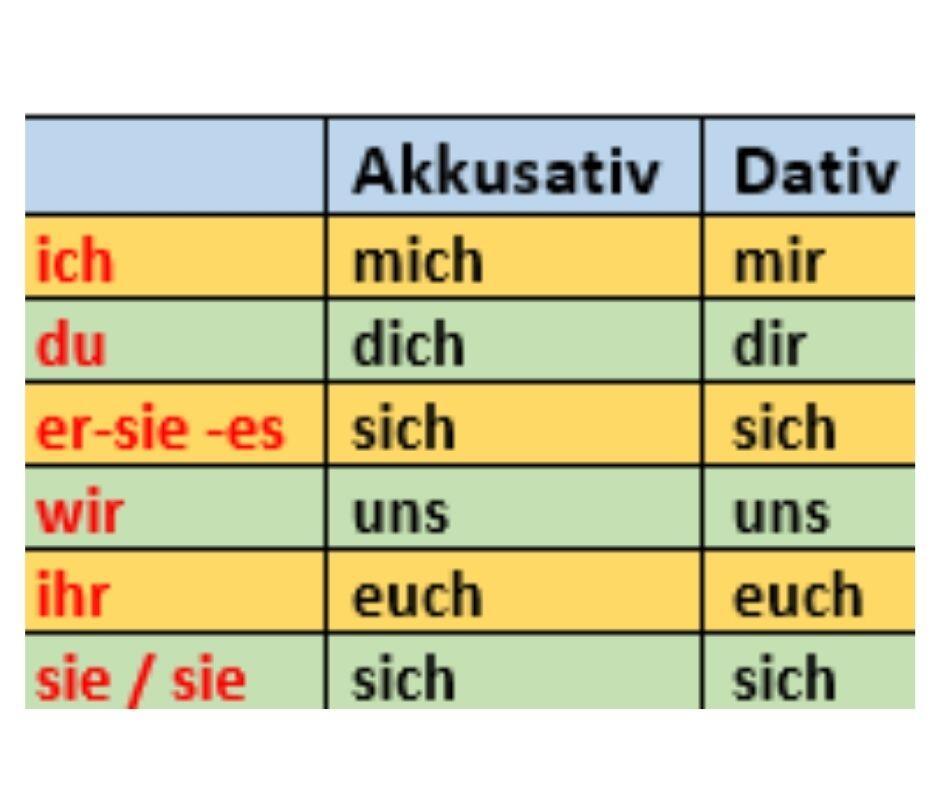OMG D mich dich sich Flickr

Was ist das? mich dich sich Flickr
Reflexivpronomen sind mich, mir, dich, dir, sich, uns, euch und sich. Sie werden mit reflexiven und reziproken Verben benutzt. Sie beziehen sich immer auf das Subjekt. Beispiel: „Ich wasche mir die Hände." „Wir treffen uns." Bildung Reflexivpronomen richten sich nach dem Subjekt und müssen dekliniert werden:

Piscine d'été de Remich Mich Dich Sich, baignade à Remich
Die Reflexivpronomen (rückbezügliche Fürwörter) in Deutsch sind mich, mir, dich, dir, sich, uns, euch und sich. Sie beziehen sich auf das Subjekt (Satzgegenstand) eines Satzes. Das heißt, ähnlich wie alle anderen Pronomen (Fürwörter), beschreiben auch Reflexivpronomen Nomen (Namenwörter) näher. Reflexivpronomen - Beispiele:

REFLEXİVPRONOMEN DEUTSCH DEUTSCHE GRAMMATİK
The personal pronouns mich, dich, ihn, sie, and es indicate the accusative case. 1. Die Rechnung geht auf mich / dich / ihn / sie / uns / euch / sie. - This is my / your/ his / her / our / their treat. ( lit. The bill is on me / you / him / her / us / you / them.) 2. Wir trinken auf mich / mich / etc. - We are drinking a toast on me / you.

Als Wir Uns Das Erste Mal Song
Sie existieren nicht ohne Reflexivpronomen. Zu diesen Verben gehören zum Beispiel: sich bedanken, sich beeilen, sich befinden, sich benehmen, sich betrinken, sich eignen, sich erholen, sich erkälten, sich schämen, sich verspäten, sich weigern. Beispiel: Jetzt muss ich mich beeilen, damit ich mich nicht verspäte.

A1, A2, B1, B2, C1, Reflexive Verben, mich, dich sich, mir, dir, uns
Rule 1: Some verbs are always reflexive, which means, we can't use them without a reflexive pronoun (mich/mir, dich/dir sich,.). The infinitive of these reflexive verbs is preceded by the pronoun "sich": German. English. sich befinden. to be located. German. English. sich beeilen. to hurry.

Grammatik презентация онлайн
Reflexivpronomen (rückbezügliches Fürwort) sind die Pronomen mich/mir, dich/dir, uns, euch, sich. Wir verwenden sie mit reflexiven und reziproken Verben; sie beziehen sich also immer auf das Subjekt. Hier lernst du die Verwendung der deutschen Reflexivpronomen. Dein Wissen kannst du anschließend in den Übungen testen.

7 best Deutsch lernen images on Pinterest Learn german, German
Note that only in the "ich" and "du" forms do reflexive pronouns differ in the accusative and dative cases (mich, mir; dich, dir).Only in the "er / sie / es" and "sie / Sie" forms do the reflexive pronouns (sich) differ from the normal personal pronouns (ihn, ihm; sie, ihr; sie, ihnen; Sie, Ihnen).3.

Image result for mich dich mir dir German language, Learn german
German reflexive verbs consist of two parts: the reflexive pronoun sich (meaning himself, herself, itself, themselves or oneself) and the infinitive of the verb. The present tense forms of a reflexive verb work in just the same way as an ordinary verb, except that the reflexive pronoun is used as well.. Ich setze mich neben dich.

Reflexive Verben, German Language Learning, Development, Art, Grammar
The German Reflexive Pronouns are mich, mir, dich, dir, sich, uns, euch and sich. We use them together with Reflexive and Reciprocal verbs. They always correspond to the subject and can only be in the Dative and Accusative case. Examples: „Ich wasche mir die Hände." „Wir treffen uns." How to form Reflexive Pronouns

Mich oder mir gewöhnen, angewöhnen, abgewöhnen, umgewöhnen?
German pronouns. German pronouns are German words that function as pronouns. As with pronouns in other languages, they are frequently employed as the subject or object of a clause, acting as substitutes for nouns or noun phrases, but are also used in relative clauses to relate the main clause to a subordinate one.

Reflexive Verben mich, dich, sich, mir, dir Learn German in Hindi
Both "me" and "you" have each two translations in German. "Me" can mean either mich or mir and "you" can mean either dich or dir. The difference between these forms is their grammar case. Mir and dir are DATIVE personal pronouns and mich and dich are ACCUSATIVE personal pronouns. Which grammar case we have to use in a sentence.

erganze die satze mich dich sich uns euch Brainly.pl
Let's Hit 20K Subs :) https://www.youtube.com/c/OnlineGermanLanguageLearning/videosMy Facebook page: https://www.facebook.com/OnlineGermanLanguageLearning/My.

Reflexivpronomen, reflexive Verben, mich mir, dich dir, sich, uns euch
Er stellt sich vor- he introduces himself. Er fragt sich- he asks himself. However there are some verbs that are reflexive in German but not English, so don't be confused if you can't always translate sich to himself/ herself/ itself. 2. [deleted] • 4 yr. ago. the verb necessitating sich is erinnern.
"mich, dich" 和 "sich" 和有什么不一样? HiNative
Reflexive pronouns (in German: Reflexivpronomen) are a subcategory of pronouns. They appear as objects and always refer to the subject of the sentence. German reflexive pronouns cannot be in the nominative case but can occur as any object. The following examples show the different roles that a reflexive pronoun (' sich, seiner, euer, euch.

OMG D mich dich sich Flickr
singular: mich/mir, dich/dir, sich; plural: uns, euch, sich; So "sich" is only used in the third person. Ich kaufe mir ein Buch. Du kaufst dir ein Buch. Er kauft sich ein Buch. Wir kaufen uns ein Buch. Ihr kauft euch ein Buch. Sie kaufen sich ein Buch. And of course, you can also buy books for someone else: Du kaufst mir ein Buch. (Danke!)

Akkusativ PART 2 Personalpronomen (mich, dich, uns) German cases
Author: Jadranka Bokan There are 4 scenarios when we are talking about reflexive verbs in German:. 1) real reflexive verbs appear always WITH the reflexive pronoun sich: ich freue mich auf die Ferien; ich erinnere mich an meine Kindheit.. Other examples: sich bemühen, sich bewerben, sich ereignen etc. The above verbs cannot be used without "sich" because that would be grammatically.